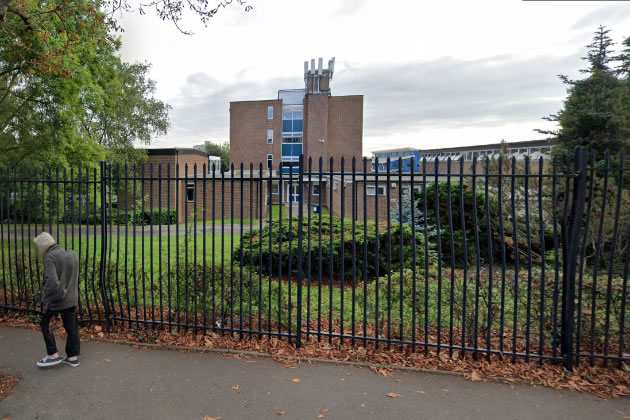One Local School Confirmed as Having Crumbling Concrete
Ellen Wilkinson forced to close canteen, science block and gym

Some of the older buildings at Ellen Wilkinson school are affected. Picture: Google Streetview
September 6, 2023
There have been no reports in the local area of children being turned away at the start of term due to concerns about the safety of school buildings. However, one school has forced to shut buildings due to emerging issues with the material used in their construction.
Over 100 schools across the country have been confirmed as having reinforced autoclaved aerated concrete (RAAC) without safety measures in place. This includes Ellen Wilkinson School in Acton which has the material causing concern in its canteen, science block, old gym and hall. These buildings have been vacated but the school will remain open and pupils have been told to bring in packed lunches while the canteen is out of use. Children on free school meals are being given vouchers.
Liberal Democrat Councillor Andrew Steed said, "Liberal Democrats are critical of the Department for Education and we are calling for an immediate survey of school buildings to ensure they are all safe for our children. Many parents in the UK have been left scrambling to arrange childcare and locally we need to ensure that the Council and schools reassure parents and children about these new arrangements so they all know how long the changes will last."
An Ealing Council spokesperson said, “We can confirm that no reinforced autoclaved aerated concrete (RAAC) has been found at any Ealing-owned school sites.
“However, it has been found at a foundation school in the borough – Ellen Wilkinson School for Girls in Acton – where it is present in some of the school’s buildings. The school will not need to close. Everyone’s primary concern is the safety of pupils and staff, and the affected areas have been taken out of use while safety measures are put in place and works arranged.”
In Hounslow Borough, there have been no reports of any issues with schools . In June 2021, a meeting of the Schools Forum reported that 15 schools in the borough may have RAAC in their structures. It was recommended that a Structural Engineer make a report on the schools, but it is not clear if this ever happened.
Councillor Lily Bath, Cabinet Member for Education, Children, Skills and Employment at Hounslow Council said, “At the request of the Department for Education (DfE), schools along with the relevant responsible bodies across the country completed surveys on the presence of RAAC, providing them with a list of potential schools effected.
“Following the untimely announcement by the DfE, the Council is now working swiftly to assess any potential impact this may have on the pupils attending schools in our area before the start of the new term. Where there may be an impact schools will communicate as early as possible with parents and the local authority will support any school within the borough that may be affected with planning and mitigating action to support continuation of children’s learning.”
RAAC is a lightweight form of concrete which appears to have bubbles in it. It was widely used between the mid-1960s to the mid-1980s as a cheaper construction material than traditional concrete and is mainly used in roofs.
The Department for Education (DfE) has said over the weekend 156 school buildings were identified as having this type of concrete, of which 52 were at risk of sudden collapse and have been closed. The others are putting in safety measures to allow them to stay open.
It is thought possible that additional schools may be found to have RAAC. A report by the National Audit Office in June identified 572 schools across the country that may have used the material in their construction.
Value Reading Articles Like This? Help Us Produce More This site remains committed to providing local community news and public interest journalism. Articles such as the one above are integral to what we do. We aim to feature as much as possible on local societies, charities based in the area, fundraising efforts by residents, community-based initiatives and even helping people find missing pets. We've always done that and won't be changing, in fact we'd like to do more. However, the readership that these stories generates is often below that needed to cover the cost of producing them. Our financial resources are limited and the local media environment is intensely competitive so there is a constraint on what we can do. We are therefore asking our readers to consider offering financial support to these efforts. Any money given will help support community and public interest news and the expansion of our coverage in this area. A suggested monthly payment is £8 but we would be grateful for any amount for instance if you think this site offers the equivalent value of a subscription to a daily printed newspaper you may wish to consider £20 per month. If neither of these amounts is suitable for you then contact info@neighbournet.com and we can set up an alternative. All payments are made through a secure web site. One-off donations are also appreciated. Choose The Amount You Wish To Contribute. If you do support us in this way we'd be interested to hear what kind of articles you would like to see more of on the site – send your suggestions to the editor. For businesses we offer the chance to be a corporate sponsor of community content on the site. For £30 plus VAT per month you will be the designated sponsor of at least one article a month with your logo appearing if supplied. If there is a specific community group or initiative you'd like to support we can make sure your sponsorship is featured on related content for a one off payment of £50 plus VAT. All payments are made through a secure web site. |